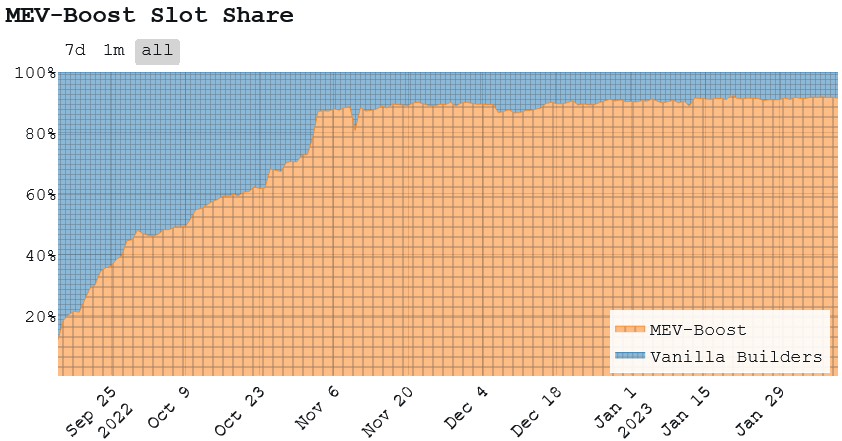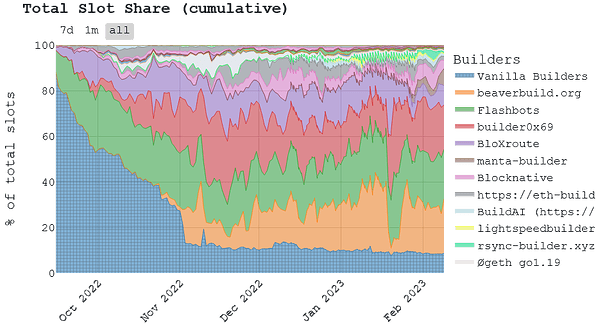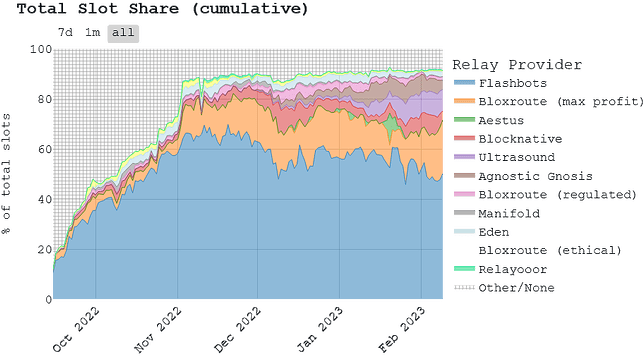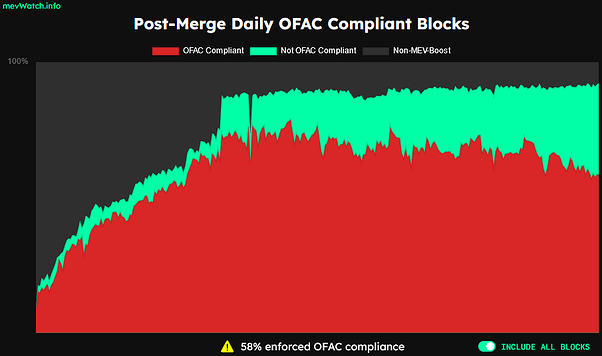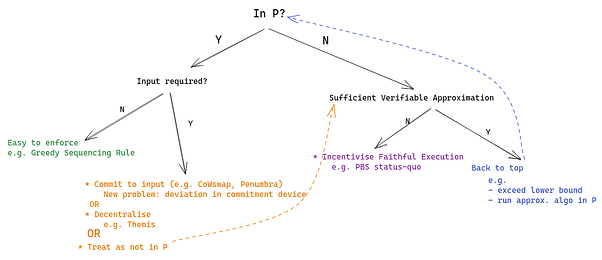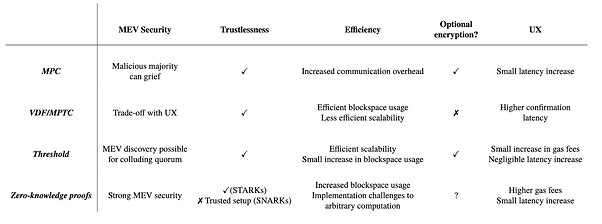Overview
After a brief hiatus during the holiday season, the Transparency Report is back with a dual edition – this edition will cover both December & January providing an overview of metrics, new developments and research. The report is also loaded with interesting resources gathered from the broader ecosystem, I hope you enjoy!
A million blocks post Merge and MEV-Boost
A million blocks have passed since the Merge and the activation of MEV-Boost, achieving off-protocol PBS and establishing open, competitive marketplaces for block builders and relays. The adoption of MEV-Boost by Ethereum validators crossed 90% in November and has remained steady ever since.
As of publishing this report, approximately 95% of newly proposed blocks are relayed through MEV-Boost. In total over 750,000 proposed blocks have been sourced from MEV-Boost since the Merge, estimated to have earned these validators an additional 100,000 ETH, increasing their median block reward by over 100%.
Democratizing access to MEV by allowing any validator to participate on an equal basis, without sophisticated infrastructure or relationships with builders, is crucial to ensure credible neutrality and a decentralized validator set on Ethereum.
From mevboost.pics
Continued diversity in the builder and relay markets
As the builder and relay markets continue to mature we see an increase in both the number of participants and the diversity of market share. A number of new builders have begun operation since the previous report, successfully winning bids and landing blocks on-chain. Even though the block-building market is still bootstrapping and the competition is fierce a growing number of builders are able to capture profits.
From mevboost.pics
A similar trend of diversification can be seen in the relay market with a greater mix of relay market share over the last months. A new content agnostic relay, Aestus, began operation in December, increasing the number of relays to 11.
From mevboost.pics
As highlighted in the previous report, the Flashbots builders are sending blocks to other relays to foster a more diverse relay market. The Flashbots builders are currently sending blocks to Agnostic Relay and Ultra Sound Relay, with an open discussion on which criteria Flashbots should use when evaluating relays to send blocks to.
The percentage of proposed blocks sourced from non content-agnostic relays continues to gradually decrease. The previous report indicated that 66% of blocks were sourced from these relays, this percentage has now decreased to 58%.
In tandem with the trend of content-agnostic relays gaining market share, various approaches to address the issue at a more fundamental level are being discussed and researched.
From mevwatch.info
Development
MEV-Boost-relay v0.15.0
The latest version of the MEV-Boost-relay, version 0.15.0, was launched last month. This release primarily features minor improvements and fixes, such as resolving 5xx errors for builder submissions.
Running Geth Within SGX
@metachris and Frieder Paape published a post on their achievement of running a working prototype of Geth inside SGX and syncing with Ethereum mainnet. Further improvement is required but the work presents a promising outlook for running complex blockchain applications within trusted execution environments (TEEs) like SGX. This is particularly relevant for decentralized block building and sharing private orderflow.
The work was performed in collaboration with konVera and the post outlines key insights for others to build upon. If you’re interested in learning more, see the forum conversation and Github repo!
Bundle cancellations and V2 stats APIs
Bundle cancellations and V2 stats APIs are now available via the official Flashbots clients
(NPM, PyPi). Adding flashbots_getUserStatsV2 and flashbots_getBundleStatsV2, as well as eth_cancelBundle for bundle cancellations.
Note that the formerly used flashbots_getUserStats and flashbots_getBundleStats methods will be deprecated on March 31.
Relayscan open source and bulk data download
Relayscan, the powerful tool for monitoring Ethereum MEV-Boost relays and builders by @metachris is now open-source.
Bulk data download has also been made available, containing almost 1 million entries about delivered payloads by MEV-Boost relays since 2022-10-18.
Optimistic Relay
Mike Neuder from ultra sound relay shared an implementation of an “optimistic” version of the MEV-Boost-Relay designed to improve block submission throughput and latency by using asynchronous processing. Instead of the relay immediately validating each block, it is added to the datastore before its validity is checked. This allows builders to submit more blocks, and to do so later during the slot time period.
Proposers select the highest bid, but the block’s validity is not guaranteed. To protect against the submission of invalid blocks, builders must put up collateral that is greater than the value of their proposed blocks. This collateral will serve as a refund in the event that the proposer signs an invalid block.
Documentation
Our documentation is undergoing a bit of a revamp with a focus on different audiences, instead of products. Over the next few months, we’ll be making continuous improvements, if you’d like to contribute or have any suggestions on how we can improve – don’t hesitate to get in touch!
Research and discussions
A Transaction Ordering Rules Taxonomy by @Quintus explores different approaches to enforce transaction ordering rules within a block. The post categorizes, and gives examples of rules that are deterministic and can be executed in polynomial time and those that are not, as well as those that can be verified without knowing the input and those that need the input to verify their validity.
From A Transaction Ordering Rules Taxonomy
Economically efficient transaction ordering and user preferences also by @Quintus outlines an underexplored direction in MEV: “Can we allow users to express preferences such that the final block is representative of the utility of all users involved?”.
Policy analysis of MEV by @MikolajBarczentewicz introduces a new paper that provides an overview for policymakers regarding what we know, and don’t know about the legal regulation of MEV. The paper argues that legal regulation of MEV extraction poses a significant threat to decentralized, permissionless cryptocurrencies, and highlights that technical solutions are preferable to national or international legal regulations as these would face the problem of regulatory arbitrage.
The discussion initiated by @josojo on the topic of a Minimal viable Decentralized Orderflow Distributer (DOFD) led to a write-up of what an MVP could look like. The write-up aims to define “a minimal viable DOFD with the lowest level of complexity that enables the decentralization of the order flow, and is useful to all involved parties at the same time”.
Flashbots Research Proposals (FRPs)
-
FRP-18: Cryptographic Approaches to Complete Mempool Privacy: @jbstearn published their findings of achieving privacy in an MEV extraction ecosystem, and the challenges in doing so. The findings suggest that cryptographic approaches can help reduce trust while highlighting the associated trade-offs.
The paper concludes that the most efficient solution currently is threshold schemes, while witness encryption is seen as a promising solution, but is currently not practical and further research is required to improve security and efficiency.
From FRP-18: Cryptographic Approaches to Complete Mempool Privacy
-
FRP-24: Quantifying MEV on L2s: @Eru_Iluvatar published an update on their work to analyze MEV on Polygon, Optimism, and Arbitrum since inception using mev-inspect-py.
Three new Flashbots Research Proposal have recently been accepted:
- FRP-25: Quantifying Fairness Granularity For First-Come-First-Serve (FCFS) Chains by saharAP and @emmanuel-awosika with the objective to quantify the “burst period” on FCFS chains as the basis of developing a better fairness granularity for fair-ordering that achieves “batch-order fairness”.
- FRP-26: Credible Commitments via Open Games by fabgenovese & philipp zahn of 20squares will study credible commitments scenarios and potentially discover new types of MEV.
- FRP-27: Auction Simulations under PBS also by fabgenovese & philipp zahn of 20squares aims to analyze the current auction mechanism in the Proposer-Builder Separation paradigm using compositional game theory. The intent is to then propose potential auction mechanisms that could enhance welfare and meet other desired goals based on the findings.
Flashbots is an open research organization and anyone can submit a research proposal and become eligible for a grant!
Sharing bookmarks and resources
@guayabyte and @alex are spearheading an effort to organize resource-lists on specific topics to be collectively built upon. The lists are intended to be living documents and aggregate valuable resources related to each specific topic.
Do you have a collection of interesting resources you would like to share? Feel free to add to them to an existing lists, or create a new one!
Below are a collection of new resource-lists created since the last report:
- Quantifying Total Extracted MEV – A List of Resources
- Bookmarks relevant for mempool privacy researchers
- Bookmarks relevant for r&d process and innovation systems researchers
- Bookmarks relevant for privacy researchers
- Bookmarks relevant for consensus researchers
Public appearances, podcasts and events
MEV-Roast Privacy
On January 11th the Flashbots tradition of MEV Roasts made a comeback with a roast on privacy, lead by roast master Justin Drake. The event brought together researchers to discuss various kinds of privacy enhancing technology (PETs), including encrypted mempools, TEEs like SGX, MPC and FHE with a spicy SGX panel to top it off.
Recordings and slides for each talk can be found below, see the forum thread for additional information:
- Why Privacy in MEV (Slides) by @Quintus
- Privacy Tradeoffs (Slides) by @Phil
- Encrypted Mempools (Slides) by Justin Drake (Ethereum Foundation)
- TEE Smart Contracts: Pitfalls and Best Practices (Slides) by @socrates1024 (UIUC)
- Minimizing MEV on Penumbra (Slides) by Henry de Valence (Penumbra)
- Private Searching on Private Transactions (Slides) by @ra
- The Joys and Challenges of Adopting PETs (Slides) by @jonathan
- Spicy SGX Panel - @socrates1024, @jonathan, @Phil. Moderated by Justin Drake
Whiteboard with Xin
The first edition of a new whiteboard series by @sxysun, which explores the concept and ideas of MEV, has been released. This series aims to explore the question of “how do we unlock the magic of trustless collaboration?” by inviting guests to each episode to discuss the topic.
In the first episode, Xin and @barnabemonnot provide an overview of credible commitment devices, making the noteworthy observation that the use of these devices leads to the inevitable emergence of MEV.
The chopping Block Ep. 449: Why the Once-Taboo MEV Is Now a Core Part of Ethereum
In episode 449 of The chopping block, Haseeb Qureshi, Tom Schmidt, and Tarun Chitra are joined by @phil to discuss “Why the Once-Taboo MEV Is Now a Core Part of Ethereum” and explores various topics including:
- The early days of MEV research and the formation of Flashbots.
- How the MEV landscape has changed over the years, including the impact of the Merge.
- The future of MEV and an introduction to SUAVE, order flow auctions and decentralized block building.
Alt View (Part 1, Part 2)
In this episode of Alt View host Yaoqi Jia speaks with @sxysun about formalizing MEV, the 3EV fable, unlocking 'the magic of credible commitment’, use cases for app-specific rollups and more.
![]() In order to stay up to date on any upcoming events feel free to subscribe to the Flashbots Collective calendar!
In order to stay up to date on any upcoming events feel free to subscribe to the Flashbots Collective calendar!
Resources
Below is a collection of publications, dashboards and other resources from the broader community posted since the last report on topics related to MEV, PBS and Flashbots. Check out the list from previous months for more fantastic resources!
Papers
- Complete Knowledge: Preventing Encumbrance of Cryptographic Secrets by Mahimna Kelkar, Kushal Babel, Philip Daian, James Austgen, Vitalik Buterin and Ari Juels introduces the concept of Complete Knowledge (CK) as a solution for encumbrance of secrets in cryptographic protocols, and presents two practical CK schemes that use special-purpose hardware and explore their practical deployment with a complete, end-to-end prototype.
- Credible, Optimal Auctions via Blockchains by Tarun Chitra, Matheus V. X. Ferreira and Kshitij Kulkarni present how Deferred Revelation Auctions (DRA) can be made credible if implemented over a secure and censorship-resistant blockchain.
- The Value of Nontoxic Orderflow to the Uniswap Protocol by Max Holloway analyzes the relationship between nontoxic orderflow and trading fees on Uniswap and presents recommendations for how the protocol should incentivize it.
- Dynamic, Private, Anonymous, Collateralizable Commitments vs. MEV by Conor McMenamin and Vanesa Daza introduce DPACCs as a way to reduce MEV by collateralizing commitments in a private and anonymous manner.
- Censorship Resistance in On-Chain Auctions by Mallesh M. Pai, Max Resnick and Elijah Fox takes a look at the problem of running an auction via smart contracts on-chain and collusion between bidders and block proposers.
- What is MEV Anyway?: An introduction to the existential threat facing all blockchains by Coinmetrics, authored by Alex R. Mead Ph.D, examinates the principles of MEV, and gives an overview of its prevalence in the Ethereum ecosystem. Through the examination of real-world examples, the report then delves deeper into the mechanics of MEV and its potential consequences.
Articles
- Block Builder Decentralization is coming, but maybe not so soon by BallsyAlchemist looks at the centralizing factors of block building, orderflow auctions, censorship resistance, and explores mechanisms to achieve decentralizing block building.
- MEV: Maximal Extractable Value Part 2: The Rise of the Builders by Christine Kim provides an overview of Flashbots and MEV as well as how the MEV landscape has evolved after the Merge with the emergence of the builder role.
- How The Shanghai Upgrade Will Impact MEV by Joel Kahil, Benn Glorfield, and Eli Barbieri discusses Ethereum’s upcoming Shanghai upgrade’s possible short and long-term impacts on MEV through liquid staking tokens and increased innovation in the market.
- MEV’s new chapter: Beyond Ethereum’s borders by Dose of Defi takes a look at the current state of MEV and how things might evolve with projects like SUAVE and CoW Protocol.
- Discrimination of Toxic Flow in Uniswap V3: Part 1 by CrocSwap looks at toxic flow in the ETH/USDC Uniswap pools and discuss potential implementations of price discrimination or flow segmentation mechanisms.
- The Year Ahead for Infrastructure by Delphi Digital looks at some emerging patterns and themes in crypto, including a part on MEV.
- Beyond ZK: The Definitive Guide to Web3 Privacy (Part 2) by Guy Zyskind is a follow-up to the first part that explores secure computation and clears up some misconceptions regarding ZKPs and TEEs.
- Block vs. Slot Auction PBS by Julian Ma examines the characteristics of block auctions and slot auctions and introduces a hybrid mechanism where builders bid in a combined block/slot auction.
- Cross-Chain Order Flow Auctions by Alana Levin looks at order flow auctions, particularly cross-chain blockspace markets, and the opportunities this creates for MEV extraction.
-
MEV: The First Five Years by James Prestwich is a narrative history of MEV and Flashbots and how the space has evolved over the years.
In the follow-up post, MEV: The Next Five Years, James gives an outlook of how the space might evolve and introduce ways MEV can be leveraged in application designs, including the introduction of MevWallet. - Builders on MEV - Analysing the impact of the OFAC sanctions on Block Builders by Toni Wahrstätter gives an overview of the cause and effect of the censorship practices by block builders.
- Most Governance Contracts Have an Upcoming Vulnerability We Should All Pay Attention To on ease.org highlight the risk of multi-block MEV in Compound Governor models.
- 100 Days after the Merge by Christine Kim presents data and insights from first 100 days since the Merge in terms of issuance, staking, MEV-Boost adoption as well the implications of validators’ withdrawals in Shanghai.
- Relay-Builders and Vertical Integration in MEV-Boost by Aestus Relay describe theoretical attacks entities that run both a MEV-Boost relay and a builder can perform.
Posts
- SUAVE Economic Security Models by @jon explores various potential economic security models for SUAVE and their implications on the network.
- terence.eth describe the impact of EIP-4844 on MEV-Boost with regard to relayers and block builders.
- @bert describes how a generalized frontrunner managed to execute a complex strategy by copying the exploiter’s previous transactions stretching 50 blocks into the past(!)
- EigenPhi published a thread on the top 20 protocols, and pools, in terms of arbitrage and sandwich volume in 2022.
- Al N published a thread describing the optimal ways to extract MEV from a large uninformed swap by visualizing three different strategies.
Dashboards
- MEV Panda, a new dashboard displaying metrics related to MEV-Boost builders and relayers on a daily and weekly basis.
- Mevboost.pics has seen several updates in the last months adding new charts and features, like block builder market over time and separate tabs for relays, builders and validators.
Other
- Recordings from the Columbia CryptoEconomics Workshop on December 1 have been published. The one-day workshop brought together practitioners, researchers, and academics to discuss challenges, recent progress, and opportunities in the Ethereum ecosystem.
- Economic Organisation in the Ethereum Protocol by @barnabemonnot provides an introduction and mental models for PBS in Ethereum PoS, multi-dimensional EIP1559 and more (Slides).
- Zero Knowledge Ep 258: Ultrasound Money & VRFs with Justin Drake gives an overview of the current state of MEV, censorship resistance and much more.
- PEEPanEIP #93: Proposer Builder Separation with Barnabé Monnot gives an overview of PBS and compares out-of-protocol, and in-protocol, PBS (Slides).
- Research on cross-chain market structure dynamics by Uniswap Foundation is a RFP open for submissions on examining cross-domain MEV and the opportunities & threats it carries or the Uniswap ecosystem.
Get involved
At Flashbots, we research and build systems around MEV, and we would love to collaborate with you. We are a distributed organization with the principles of a pirate hacker collective, and we have several open positions. We also issue grants to external researchers doing work aligned with ours, please find out more in our Research repository.
Make sure to also look around on our forum and join the conversations!
